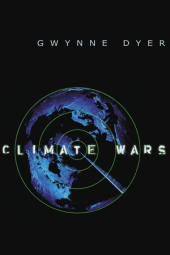Warning, Canadian politics ahead. I generally try to avoid politics here but hopefully one or two posts per election isn’t too annoying.
I’ve voted Conservative as many times as Liberal and I try not to be partisan.
This time I will vote Liberal – perhaps with a bit less enthusiasm than last time. There are a bunch of reasons for and against but the main ones are: climate plan, taxes, deficit and that, in my view, the current Conservative party isn’t really a conservative party anymore.
Let’s start with the approaches to climate change. The Liberal plan has a carbon price. Putting a price on something and letting individuals and businesses optimize it away is fundamentally a conservative approach that is based on the key principles of our market based economy. It is widely accepted by economists as the most cost effective way to tackle climate change. Sadly, the current Conservative party has chosen to ignore their own principles and demonize this approach because it’s easy to talk about a ‘tax’ and scare people. They also take advantage of the fact that the rebate approach which leaves >80% households better off is counter intuitive to most people who don’t investigate how it works. Instead of this small government, market based approach, the Conservative party has settled on something with no targets and more government intervention. Bluntly, I don’t see principled conservatism here. I see opportunistic populism. One of my biggest fears of this election is that if the Liberals lose, no major party will touch carbon pricing for a long time.
On to taxes. I’m not someone who votes for tax cuts and certainly not tax cuts for people like me who don’t need them. I’m quite fine with the taxes I pay and what I get in return – things like schools which train my employees and the roads that get them to work and free healthcare (that doesn’t mean I’m OK with waste but that is another discussion). That said those who do care about tax cuts should know that in the last four years the small business tax rate has been cut and most people pay less federal tax than when the Conservatives formed the government. On the small business front, the Liberals reduced the small business tax rate but also made some changes which were designed to target professionals like doctors who used small businesses to avoid paying their fair share of income tax (like everyone else with a job does). In this campaign, the Conservatives have used these changes to try to paint the Liberals as anti-small business. As someone who in theory ‘lost out’ in those changes, I 100% disagree. Business owners get to keep all the profits of the business, that’s the point. We don’t need and shouldn’t get special benefits on the income tax front for ourselves or our family. Cutting the small business tax rate as a trade-off to close these loopholes seems more than fair to me. On a side note, the idea that there were (are?) enough loopholes that ‘tax planning’ exists is very sad. Simple is better. Also, the Conservative party’s love of non-refundable tax credits (only those wealthy enough to pay tax benefit) for stuff like sports is in-efficient and gimmicky.
Deficit. I’m not a fan of deficits and this is definitely a point against the Liberal plan – at least if you believe the Conservative plan. I especially don’t like the increased spending promises that happened during the election campaign. That said, the current government’s spending is actually *lower* as a percent of GDP (comparing total dollars over time makes no sense because of inflation) than when the Conservatives last formed government so when I hear them talk about the current level of deficit being the end of the world, it falls on (my) deaf ears.
At just 1 per cent of GDP, federal debt-service costs in 2018-19 were lower than at any time since at least the mid-1960s. Ottawa is currently spending less on debt servicing than during the Stephen Harper era.
https://www.theglobeandmail.com/opinion/editorials/article-the-debt-the-deficit-and-other-things-this-election-isnt-about/
The deficit has been growing more slowly than the economy so the debt burden is actually doing *down*. Finally, the ‘good financial stewards’ message that the Conservatives tout is marketing not truth.

More important to me than all the above is that current Conservative party is now more of a populist party than a true conservative party and at least some people at CPC HQ have some pretty questionable morals.
On the populist side, I’ve already mentioned one area, climate policy, where they are quite happy to ignore real small government and market principles and leap to populist messages and more direct government intervention. Promising to bring back the tax loopholes, under the populist guise of helping small businesses, is in the same category.
Regarding party morals, I could go on at some length about the things I’ve seen during this campaign that bother me but a couple highlights are:
- Scheer keeps saying that the current Liberal government has increased federal taxes on the middle class. This is a straight out misdirection based on a technicality. He knows better and he says it over and over again because he knows most people can’t fact check it.
- Blowing up a summary of public town hall meeting to create a 100% false scare about a secret plan to create a housing tax. Peddled by the main CPC social media accounts.
- Not releasing their full plan until after the debates. Presumably in the hope that most people won’t notice the budget cuts while still being able to leverage them to energize their base.
When I mention these things the first retort is usually that all sides are doing this. Since these tactics bother me a lot and I don’t want to vote for anyone that goes down this path, I spent a couple hours comparing the CPC and LPC Facebook pages to get a sense of the tone and fact check the posts. The CPC page is so much worse in this regard that it is hard to talk about. Try this exercise for yourself and I’m confident you will reach the same conclusion. I don’t know if my local CPC candidate is as morally bankrupt as the central CPC team is but as leader, Scheer gets to wear the stink of this from my point of view.
In the end, what I really want is a fiscally conservative party without the crazy. Until that party exists (again?), I will live with (small) deficit spending to get a climate policy that has a chance of helping, tax cuts for lower income people and much less repugnant election tactics. In actuality, I’d like to see the current Conservative election campaign fail just to discourage others from trying these tactics again.
For anyone thinking about voting Green or NDP on environmental grounds, I understand that position but I think it’s dangerous to let idealism win out over practicality. The Liberal government would continue to move in the right direction on climate change and other environmental dimensions much more quickly than a Conservative government will. It may not be as fast as you would like but it’s in the right direction and from that point, it will be easier to push farther. I am also concerned that the Green party’s aggressive plan will be so disruptive that it will turn the tide of public opinion against climate change action. Society can only absorb so much change at once and people who are scared for their jobs will choose their economic security over environmentalism every time.
